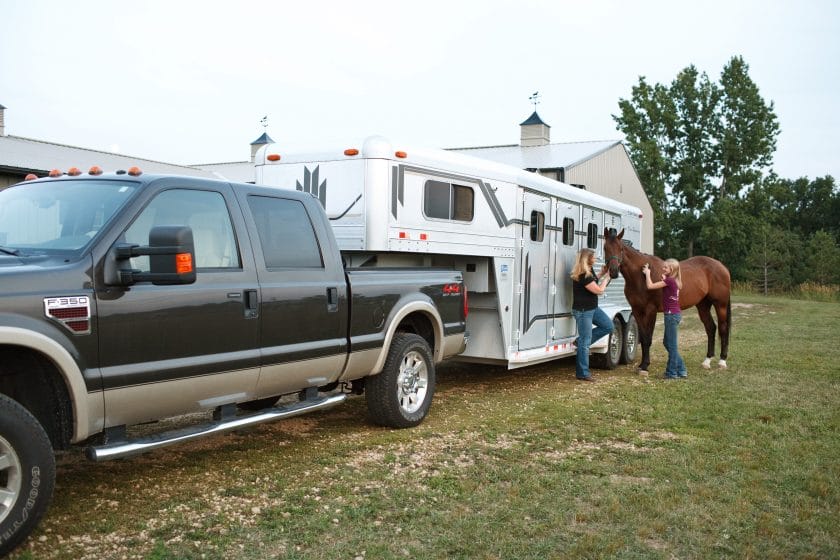A horse can generally stand in a trailer for several hours, depending on various factors such as their age, health, and temperament.
It is important to ensure that the trailer is properly ventilated, has enough space for the horse to move comfortably, and is well-padded to reduce any potential discomfort or injuries.
Additionally, it is crucial to provide the horse with water and regular breaks to stretch their legs and relieve any stress or muscle tension.
Transporting horses in a trailer should always be done with their well-being in mind, ensuring their safety and minimizing any potential risks or discomfort.

Factors influencing the duration a horse can stand in a trailer
When it comes to transporting horses, the duration they can comfortably stand in a trailer is influenced by several factors. It is important to consider these factors to ensure the well-being and safety of the horse during transportation. Let’s take a closer look at some of the key factors that can affect the duration a horse can stand in a trailer.
1. Size and Type of the Trailer
The size and type of the trailer play a crucial role in determining the comfort level of the horse. A spacious trailer with adequate headroom, width, and length allows the horse to stand more comfortably. Additionally, trailers with appropriate ventilation and natural light will create a more pleasant environment for the horse during transportation.
2. Temperature and Climate
The temperature and climate inside the trailer can significantly impact the duration a horse can stand. Horses are susceptible to extreme temperatures, both hot and cold. It is essential to maintain a well-regulated temperature inside the trailer, ensuring adequate insulation and ventilation. This will help prevent the horse from overheating or becoming too cold during transportation.
3. Behavior and Training of the Horse
The behavior and training of the horse also play a vital role in its ability to stand in a trailer for an extended period. Well-trained horses are generally more relaxed and less likely to become agitated or stressed during transportation. Horses that are accustomed to trailer travel and have been properly desensitized to the experience will typically exhibit calmer behavior, making it easier for them to stand in the trailer for longer durations.
4. Fitness and Health of the Horse
The fitness and overall health of the horse are critical factors in determining how long it can stand in a trailer. Horses that are in good physical condition, with strong muscles and joints, are more likely to withstand longer journeys without experiencing discomfort or fatigue. Regular exercise and proper veterinary care are essential to ensure the horse is fit for transportation.
5. Duration of the Journey
The duration of the journey itself can impact how long a horse can stand in a trailer. Horses are capable of standing for several hours, but it is crucial to provide regular breaks for rest, hydration, and stretching. Long journeys without breaks may lead to increased stress, fatigue, and the possibility of developing health issues.
6. Loading and Unloading Techniques
The loading and unloading techniques used can also influence the horse’s comfort and ability to stand in a trailer. Proper training and handling during these processes help minimize stress and anxiety for the horse. Using positive reinforcement, gradual loading and unloading, and ensuring a calm and quiet environment can make a significant difference in the horse’s willingness to stand during transportation.
In summary, the duration a horse can comfortably stand in a trailer is influenced by factors such as the size and type of the trailer, temperature and climate, behavior and training of the horse, fitness and health, duration of the journey, and loading and unloading techniques. By considering these factors and taking necessary precautions, horse owners and handlers can ensure the well-being and safety of their horses during transportation.

Tips for Ensuring Horse Comfort During Trailer Journeys
Transporting horses can be a stressful experience for both the animals and their owners. However, with proper planning and preparation, you can ensure a comfortable and safe journey for your horses. In this section, we will discuss some essential tips to keep your horses comfortable during trailer journeys.
1. Choose the Right Trailer
The first step in ensuring horse comfort is selecting a suitable trailer. The trailer should be spacious enough to allow the horse to move comfortably, but not so large that they can become unbalanced or injured during transit. Ensure that the trailer is well-ventilated, with windows or vents that can be adjusted to control airflow. Additionally, consider using a trailer with rubber flooring to provide better traction and reduce the risk of slipping.
2. Proper Loading and Securing
When loading your horse onto the trailer, take the time to do so calmly and gently. Use a ramp if available, as it provides a less steep and safer descent into the trailer. Once inside, secure the horse’s head with a properly fitted halter and fasten the lead rope to prevent them from moving around excessively. Use appropriate dividers or partitions to separate multiple horses and prevent them from kicking or leaning on each other.
3. Bedding and Comfort
Providing comfortable bedding is essential for long journeys. Use bedding material such as straw or shavings to absorb shocks and vibrations during transit. Ensure that the bedding is evenly distributed and regularly replaced if it becomes soiled or uncomfortable for the horse. Additionally, consider using protective leg wraps or boots to offer extra support and cushioning during the ride.
4. Temperature Control
Monitoring and controlling the temperature within the trailer is crucial for horse comfort. During warmer months, ensure proper ventilation and use fans if necessary to keep the air circulating. On colder days, provide adequate insulation by adding layers or blankets to protect horses from the cold. It’s also important to avoid extreme temperature fluctuations, as they can stress the horse and compromise their well-being.
5. Regular Breaks
Long journeys can be tiring for horses, both physically and mentally. Plan for regular breaks to allow them to rest and stretch their legs. Ideally, stop every few hours to give them an opportunity to drink water and graze if possible. Use these breaks to check on your horse’s well-being and make any necessary adjustments to ensure their comfort.
6. Calm and Smooth Driving
Smooth driving can significantly reduce stress and anxiety for horses during transit. Avoid sudden accelerations, harsh braking, and sharp turns that can cause the horse to lose balance. Drive cautiously and maintain a steady speed throughout the journey.
7. Adequate Hydration and Nutrition
Always ensure that your horse has access to fresh water both before and during the journey. Dehydration can lead to numerous health issues, so make sure to offer water regularly and monitor their intake. When it comes to feeding, provide hay or forage before and during the journey to keep their digestive system functioning properly.
8. Familiarize Your Horse with the Trailer
Prior to the journey, spend time familiarizing your horse with the trailer to reduce anxiety. Allow them to enter the trailer voluntarily and reward them with treats or praise. Gradually increase the duration of their stay in the trailer and simulate the conditions they will experience during transport. This process will help build their confidence and make the trailer a more comfortable space for them.
By following these tips, you can ensure that your horses have a comfortable and stress-free journey in the trailer. Remember to plan ahead, make necessary preparations, and monitor your horse’s well-being throughout the journey.

Signs of Distress to Watch for During Horse Trailer Transport
Transporting horses can be a stressful experience for them, especially if they are not accustomed to being in a trailer. As a responsible horse owner, it’s important to keep a close eye on your horse during transportation to ensure their safety and well-being. Here are some signs of distress to watch for during horse trailer transport:
1. Excessive sweating
If your horse is sweating profusely during the trailer ride, it may be a sign of distress. While some sweating is normal due to the physical exertion of being transported, excessive sweating can indicate that your horse is anxious or experiencing discomfort. Make sure to address any underlying issues that may be causing this excessive sweating.
2. Increased heart rate
Monitoring your horse’s heart rate during transportation can provide valuable insights into their stress levels. An elevated heart rate may indicate that your horse is feeling anxious or fearful. Use a heart rate monitor or check their pulse regularly to ensure it remains within a safe range.
3. Restlessness and pawing
If your horse is constantly moving around or pawing at the trailer floor, it may be a sign of distress. Restlessness can indicate that your horse is uncomfortable or experiencing unease. Take note of this behavior and consider making adjustments to the trailer setup or seeking professional advice if necessary.
4. Excessive vocalization
Horses communicate through vocalization, but excessive whinnying, neighing, or screaming during trailer transport may indicate distress. Pay attention to the frequency and intensity of your horse’s vocalizations. If they are excessively vocal, it may be a sign that they are feeling anxious or stressed.
5. Heavy breathing and rapid panting
If your horse is breathing heavily or panting rapidly during the trailer ride, it can be a sign of distress. While some level of increased respiration is normal during transportation, excessively heavy breathing may indicate that your horse is struggling to cope with the situation. Take measures to ensure proper ventilation and a comfortable environment for your horse.
6. Refusing to load or unloading abruptly
A horse that refuses to load into the trailer or unloads abruptly before reaching the destination may be displaying signs of distress. These behaviors can suggest that your horse is fearful or uncomfortable with the transportation process. Take the time to address any underlying issues and provide proper training to make the loading and unloading experience less stressful for your horse.
7. Loss of appetite
Horses can experience a loss of appetite when they are stressed or anxious. If your horse refuses to eat or shows a significant decrease in their usual food intake during trailer transport, it may be a sign of distress. Monitor their eating habits and seek advice from a veterinarian if the loss of appetite persists.
8. Excessive urination and defecation
While it’s normal for horses to urinate and defecate during transportation, an excessive amount of it can be an indicator of distress. If your horse is consistently urinating or defecating more than usual, it may be a sign of anxiety or discomfort. Keep an eye on their elimination patterns and consult with a veterinarian if you have concerns.
It’s important to remember that every horse is unique, and their reactions to trailer transport may vary. It’s crucial to know your horse’s normal behavior and monitor any changes during transportation. If you notice any signs of distress, take appropriate measures to address the issue and ensure the well-being of your horse throughout the journey.
How to Prepare Horses for Extended Periods in a Trailer
Transporting horses in trailers can be a stressful experience for them, especially when it comes to long journeys. However, with proper preparation and care, you can ensure that your horses stay comfortable and safe throughout the trip. Here are some essential tips to help you prepare your horses for extended periods in a trailer.
1. Get the Right Trailer
Before embarking on a long journey, it’s crucial to have a suitable trailer that is well-ventilated, spacious, and has proper safety features. Ensure that the trailer is large enough for your horse to move comfortably and has sufficient headroom to avoid injuries.
2. Gradually Introduce Your Horse to the Trailer
Horses can be apprehensive about entering trailers, especially if they have never been in one before. Start by introducing your horse to the trailer gradually. Begin with short sessions where your horse can get accustomed to being in the trailer without moving. Use positive reinforcement and treats to create a positive association with the trailer.
3. Familiarize Your Horse with Trailer Sounds and Movements
Horses can also get anxious due to the sounds and movements of the trailer. Before the trip, expose your horse to similar sounds and motions. For example, play recordings of engine noises or gently rock the trailer to simulate traveling conditions. This will help desensitize your horse and reduce anxiety during the actual journey.
4. Practice Loading and Unloading
Ensure that your horse is comfortable with loading and unloading from the trailer. Practice these maneuvers beforehand to make the process smoother and less stressful. Use patience, positive reinforcement, and reward your horse for a job well done to create a positive experience.
5. Plan for Frequent Breaks
Extended periods of confinement can be tiring and uncomfortable for horses. Plan for frequent breaks during the journey to allow your horse to stretch, relax, and have access to fresh water and food. Regular breaks will also help prevent fatigue and reduce the risk of injuries caused by prolonged standing.
6. Provide Adequate Ventilation and Temperature Control
The trailer should have proper ventilation to ensure fresh air circulation during the journey. Install fans or windows that can be opened to maintain good airflow. Additionally, consider the temperature inside the trailer and provide appropriate temperature control measures, such as insulation or fans, to keep your horse comfortable in both hot and cold weather.
7. Secure Your Horse Properly
Ensure that your horse is properly secured inside the trailer to prevent injuries during the journey. Use properly fitted halters, lead ropes, and trailer ties to secure your horse. It’s essential to strike a balance between keeping your horse secure and allowing them enough freedom of movement to maintain balance and comfort.
8. Monitor Your Horse Throughout the Journey
Keep a close eye on your horse during the journey. Monitor their behavior, body language, and overall well-being. If you notice any signs of distress, discomfort, or unusual behavior, consider stopping and assessing the situation. It’s always better to be cautious and prioritize your horse’s safety and well-being.
9. Prepare an Emergency Kit
Be prepared for any emergencies that may arise during the journey. Pack an emergency kit that includes essentials such as first aid supplies, extra halters and lead ropes, hoof care equipment, and contact information for veterinarians along your route. This will ensure that you have the necessary resources to handle any unexpected situations.
10. Gradually Adjust to New Environments
When arriving at your destination, allow your horse some time to adjust to the new environment before unloading them from the trailer. Horses may feel disoriented or anxious after a long journey, so giving them a few minutes to acclimate can help ease their transition.
In summary, preparing horses for extended periods in a trailer requires careful planning, gradual introduction, and ensuring their comfort and safety throughout the journey. By following these tips, you can minimize stress and make the travel experience more pleasant for your horses.
FAQs
How long can a horse stand in a trailer?
The maximum recommended time for a horse to stand in a trailer is 8 hours. However, it is essential to provide breaks during long journeys to allow the horse to rest, drink water, and stretch its legs to avoid discomfort and stress.
Conclusion
In conclusion, the duration a horse can stand in a trailer depends on various factors, such as the horse’s age, health, temperament, and the conditions within the trailer. While horses are naturally adaptable animals, it is essential to prioritize their well-being during transportation.
Providing sufficient space, ventilation, and comfort can help minimize stress and fatigue. Regular breaks and gentle exercises can also help to prevent muscle stiffness and promote circulation. Additionally, ensuring the trailer is properly maintained and meets safety standards is crucial for the horse’s welfare.
Ultimately, it is advisable to consult with equine professionals and consider the specific needs of the horse to determine the appropriate duration for them to stand in a trailer.
